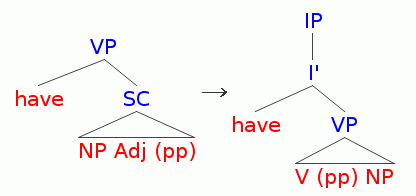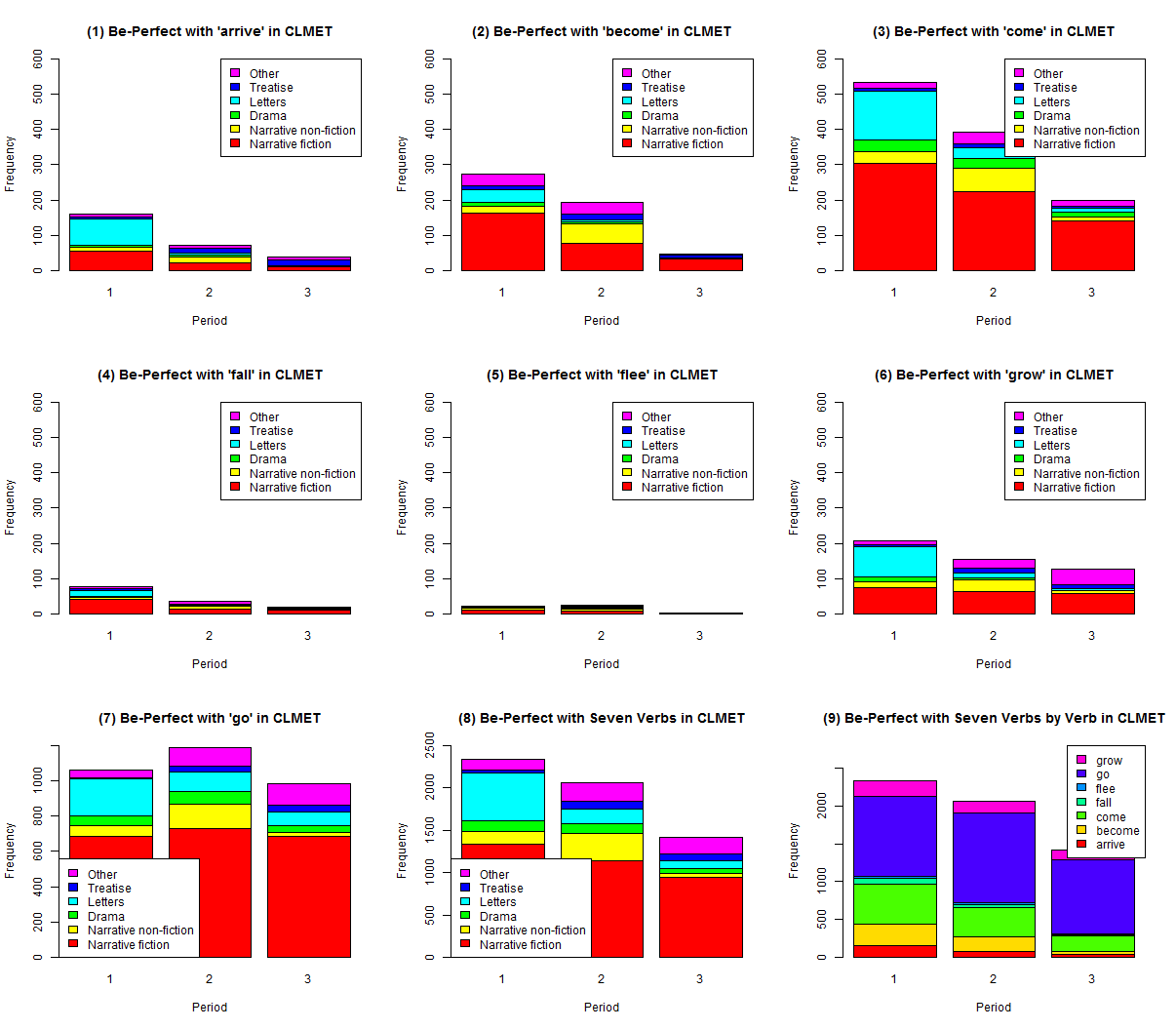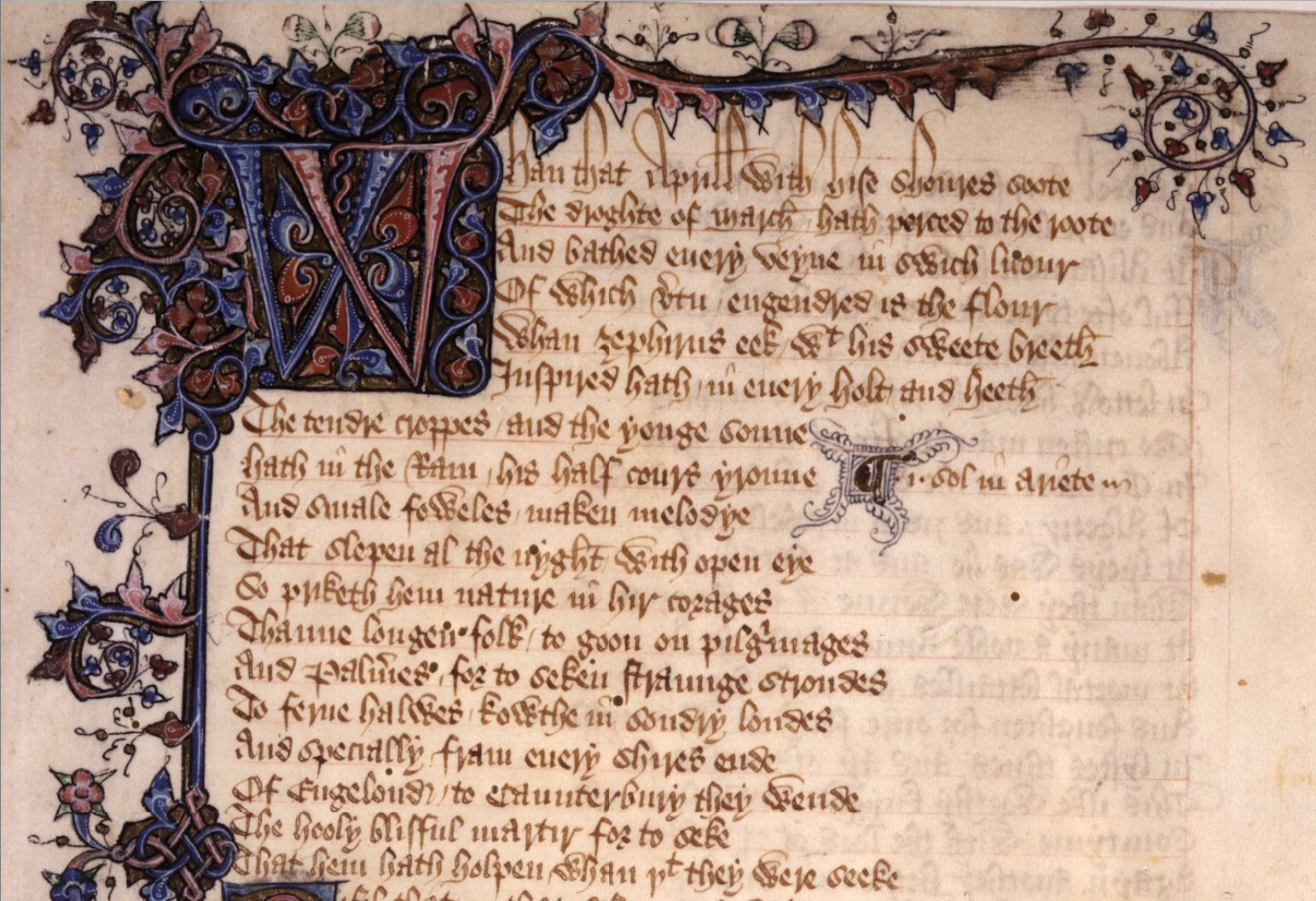2016-07-14 Thu
■ #2635. ヨーロッパにおける迂言完了の地域言語学 (2) [perfect][syntax][wave_theory][linguistic_area][geolinguistics][geography][contact][grammaticalisation][preterite][french][german][tense][aspect]
昨日の記事 ([2016-07-13-1]) で,ヨーロッパ西側の諸言語で共通して have による迂言的完了が見られるのは,もともとギリシア語で発生したパターンが,後にラテン語で模倣され,さらに後に諸言語へ地域的に拡散 (areal diffusion) していったからであるとする Drinka の説を紹介した.昨日の記事で (3) として触れた,もう1つの関連する主張がある.「フランス語やドイツ語などで,迂言形が完了の機能から過去の機能へと変化したのは,比較的最近の出来事であり,その波及の起源はパリのフランス語だった」という主張である.
ここでは,まずパリのフランス語で迂言的完了が本来の完了の機能としてではなく過去の機能として用いられるようになったことが主張されている.Drinka (22--24) によれば,パリのフランス語では,すでに12世紀までに,過去機能としての用法が行なわれていたという.
It is here, then, in Parisian French, that I would claim the innovation actually began. In the 12th century, the OF periphrastic perfect generally had an anterior meaning, but a past sense was already evident in vernacular Parisian French in the 12th and 13th c., connected with more vivid and emphatic usage, similar to the historical present . . . . During the 16th c., perfects had already begun to emerge in French literature in their new function as pasts, and during the 17th and 18th centuries, the past meaning came to replace the anterior meaning completely in the language of the French petite bourgeoisie . . . .
他のロマンス諸語や方言は遅れてこの流れに乗ったが,拡散の波は,語派の境界を越えてドイツ語にも広がった.特に文化・経済センターとして早くから発展したドイツ南部都市の Augsburg や Nürnberg では,15世紀から16世紀にかけて,完了が過去を急速に置き換えていった事実が指摘されている (Drinka 25) .フランスに近い Cologne や Trier などの西部都市では,12--14世紀というさらに早い段階で,完了が過去として用いられ出していたという証拠もある (Drinka 26) .
もしこのシナリオが事実ならば,威信をもつ12世紀のパリのフランス語が,完了の過去機能としての用法を一種の流行として近隣の言語・方言へ伝播させていったということになろう.地域言語学 (areal linguistics) や地理言語学 (geolinguistics) の一級の話題となりうる.
・ Drinka, Bridget. "Areal Factors in the Development of the European Periphrastic Perfect." Word 54 (2003): 1--38.
2016-07-13 Wed
■ #2634. ヨーロッパにおける迂言完了の地域言語学 (1) [perfect][syntax][wave_theory][linguistic_area][geolinguistics][geography][contact][grammaticalisation][preterite][greek][latin][tense][aspect]
英語を含むヨーロッパ諸語では,have や be に相当する助動詞と動詞の過去分詞形を組み合わせて「完了」を作ることが,広く見られる.ヨーロッパ内でのこの言語項の地域的な分布を地域言語学 (areal linguistics) や地理言語学 (geolinguistics) の立場から調査して,その発生と拡大を歴史的に明らかにしようとした論文を見つけた.
論者の Drinka は,まずヨーロッパの言語地図を見渡したうえで,(1) have による完了を発達させたのは西側であり,東側では be が優勢であることを指摘した.次に,(2) 西側の have 完了の発生と,過去分詞形が受動的な意味から能動的な意味へと再解釈された過程の起源は,ともに古代ギリシア語に遡り,それをラテン語が真似たことにより,後のロマンス諸語やその他の言語へも広がっていったと議論している.最後に,(3) フランス語やドイツ語などで,迂言形が完了の機能から過去の機能へと変化したのは,比較的最近の出来事であり,その波及の起源はパリのフランス語だったと論じている.
(2) について,もう少し述べよう.ギリシア語では元来,迂言的完了は「be +完了分詞」で作っていた.しかし,「have + 中間分詞」の共起がときに完了に近い意味を表わすことがあったために,徐々に文法化のルートに乗っていった.紀元前5世紀までには「have +アオリスト分詞」という型が現われ,それまでは構文を作らなかった他動詞も参入するほどの勢いを示し,隆盛を極めた.ラテン語や後の西側の言語にとっては,このギリシア語ですでに文法化していた「have + 分詞」のパターンが,文語レベルで模倣の対象となったという.have 完了が世界の言語では比較的まれな構造であることを考えると,ラテン語(やその他の西側の言語)で独立して発生したと考えるよりは,ギリシア語との接触によるものと考えるほうが自然だろうと述べられている (16) .Drinka (20) が have 完了のギリシア語起源論について以下のように要約している.
My claim, then, is that the actual concept of HAVE periphrasis owes its existence largely to the Greek model, that the development of the HAVE perfect in Latin is tied closely to that of Greek, that it arose especially in literary contexts and in the language of educated speakers, and continued to be connected to the formal register in its later history. As a result of this learned calquing of the HAVE perfect from Greek into Latin, including ecclesiastical Latin, the Western European languages were, in turn, given a model to aspire to, a more elaborate temporal-aspectual system to imitate. The Romance languages, of course, all inherited these perfect structures, and, as I will argue elsewhere, most of the Germanic languages appear to have developed their HAVE perfect categories on the basis of this elaborated model, as well . . . . What is particularly fascinating to note is that the western languages have preserved and innovated upon this pattern to different extents, but continually show patterns of areal diffusion as these innovations spread from one language to another.
英語史との関連で気になるのは,英語の have による迂言的完了の起源と発展について,Drinka が明示的にはほとんど述べていないことである.Drinka は,英語での例も,ヨーロッパ西側の「地域的な拡散」 (areal diffusion) の一環と見ているのだろうか.とすると,従来の説とは異なる,かなり大胆な仮説ということになる.英語史上の関連する話題としては,「#2490. 完了構文「have + 過去分詞」の起源と発達」 ([2016-02-20-1]) と「#1653. be 完了の歴史」 ([2013-11-05-1]) も参照されたい.
また,上の議論では,ラテン語が迂言用法をギリシア語から「借用」したという言い方ではなく,"model" という「模倣」に近い用語が用いられている.この点については「#2010. 借用は言語項の複製か模倣か」 ([2014-10-28-1]) の議論も参考にされたい.
・ Drinka, Bridget. "Areal Factors in the Development of the European Periphrastic Perfect." Word 54 (2003): 1--38.
2016-07-12 Tue
■ #2633. なぜ現在完了形は過去を表わす副詞と共起できないのか --- Present Perfect Puzzle [perfect][aspect][preterite][tense][adverb][present_perfect_puzzle][pragmatics][sobokunagimon]
「#2492. 過去を表わす副詞と完了形の(不)共起の歴史 」 ([2016-02-22-1]) で取り上げた Present Perfect Puzzle と呼ばれる英文法上の問題がある.よく知られているように,現在完了は過去の特定の時点を指し示す副詞とは共起できない.例えば Chris has left York. という文法的な文において,Chris が York を発ったのは過去のはずだが,過去のある時点を指して *Yesterday at ten, Chris has left York とすると非文法的となってしまう.この "past-adverb constraint" がなぜ課されているのかを説明することは難しく,"puzzle" とされているのだ.
1つの解決法として提案されているのが,"scope solution" である.現在完了を作る助動詞 have が現在を指し示しているときに,過去を指し示す副詞の作用域 (scope) がその部分を含む場合には,時制の衝突が起こるという考え方だ.素直な説のように見えるが,いくつかの点で難がある.例えば,Chris claims to have left York yesterday. では,副詞 yesterday の使用域は to have left York までを含んでおり,その点では先の非文の場合の使用域と違いがないように思われるが,実際には許容されるのである.また,この説では,現在完了は,過去どころか現在の時点を指し示す副詞とも共起し得ないことを説明することができない.つまり,*Chris has been in Pontefract last year. が非文である一方で,*Chris has been in Pontefract at present. も非文であることを説明できない.
次に,根強く支持されているい説として "current relevance solution" がある.現在完了とは,現在との関連性を標示する手段であるという考え方だ.あくまで過去から現在への継続を示すのが主たる機能なのであるから,過去を明示する副詞との共起は許されないとされる.母語話者の直感にも合う説といわれるが,過去と現在の関連性は,実は過去形によって表わすこともできるではないかという反論がある.例えば,Why is Chris so cheerful these days? --- Well, he won a million in the lottery. では,現在と過去の関連性がないとは言えないだろう.また,過去と現在の関連性が明らかであっても,*Chris has been dead. は許されず,Chris was dead. は許される.
Klein (546) は従来の2つの説を批判して,語用論的な観点からこの問題に迫った.TT (= "topic time" = "the time for which, on some occasion, a claim is made" (535)) と TSit (= time of situation) という2種類の時間指示を導入して,1つの発話のなかで,TT と TSit の表現が,ともに独立して過去の定的な時点を明示 (p-definite (= point-definite)) してはならない制約があると仮定した.
P-DEFINITENESS CONSTRAINT
In an utterance, the expression of TT and the expression of TSit cannot both be independently p-definite.
ここで Klein の議論を細かく再現することはできないが,主張の要点は Present Perfect Puzzle を解く鍵は,統語論にはなく,語用論にこそあるということだ.上に挙げてきた非文は,統語的に問題があるのではなく,語用的にナンセンスだからはじかれているのである."p-definite constraint" は,このパズルを解くことができるだけではなく,例えば *Today, four times four makes sixteen. がなぜ許容されないのか(あるいはナンセンスか)をも説明できる.ここでは,動詞 makes (TT) と副詞 Today (TSit) の両方が独立して,現在の時点を表わしている (p-definite) ために,語用論的に非文となるのだという.
"p-definiteness constraint" は,もう1つのパズルの解き方の提案である.
・ Klein, Wolfgang. "The Present Perfect Puzzle." Language 68 (1992): 525--52.
2016-02-22 Mon
■ #2492. 過去を表わす副詞と完了形の(不)共起の歴史 [perfect][preterite][tense][aspect][syntax][auxiliary_verb][adverb][generative_grammar][present_perfect_puzzle]
「#2490. 完了構文「have + 過去分詞」の起源と発達」 ([2016-02-20-1]) で触れたように,中英語期に完了構文が統語的に確立した後も,機能的には過去形との分化は初期近代英語までそれほど明確な形で見られなかった.その証拠に,近代以前には過去の時点を指示する副詞(句)と完了形が共起する例が少なからず文証される.この件について,Mustanoja (504) を引用しよう.
In ME and early Mod. E the functional distinction between the preterite and the compound tenses of the past is not, however, nearly so clear-cut as it is today, and the perfect, for example, may occur in conjunction with adverbs of past time: --- and homward he shal tellen othere two [tales], Of aventures that whilom han bifalle (Ch. CT A Prol. 795).
しかし,16--17世紀になるとこの状況は変化し,現代英語のように完了形と過去の副詞(句)の共起が許されなくなっていく.フランス語やドイツ語など近隣の諸言語が,同様の複合形を単純過去時制を表わすのに保持してきたのと対照的に,英語ではこの時期を境に完了時制と過去時制が形態・機能ともに明確に区別されるようになったのである.なぜ英語の歴史においては,このような区別が生じたのだろうか.そして,なぜとりわけこの時期に生じたのだろうか.この辺りの問題は,生成文法の理論的な立場から "present perfect puzzle" と呼ばれている.
英語と近隣諸言語を比較した Yanagi によれば,have に相当する助動詞に V-to-T movement が生じる言語(古い英語,フランス語,ドイツ語,アイスランド語など)については過去分詞も平行して移動するが,そうでない言語(現代英語や大陸スカンディナヴィア語)については過去分詞も移動しない.そして,この各項の統語的な移動の有無が,時制を構成する3要素 (Event Point, Speech Point, Reference Point) の相互関係と連動しており,機能的に過去時制に近づくか,完了時制に近づくかを決定するという.V-to-T movement については,名前こそ異なれ,実質的にほぼ同じ現象について扱った「#1670. 法助動詞の発達と V-to-I movement」 ([2013-11-22-1]) を参照していただきたいが,この一見してきわめて統語的な現象が,時制という機能と密接に関連している可能性があるということは,実に興味深い.とりわけ重要な点は,V-to-T movement が起こったとされる時期と,過去を表わす副詞と完了形の共起が許されなくなり始める時期が,16世紀で符合することである.
Yanagi の結論部 (96) を引用しよう.
Here it has been argued that the obsolescence of the present perfect puzzle in the history of English can be attributed to the loss of overt verb movement by using the following assumptions: (a) In a language with independent V-to-T movement, perfect participles can move overtly; (b) In a language without independent V-to-T movement, perfect participles cannot move overtly. In addition, the viability of the present analysis was further supported by applying it to modern Germanic and Romance languages. As a theoretical contribution, it is semantically motivated.
・ Mustanoja, T. F. A Middle English Syntax. Helsinki: Société Néophilologique, 1960.
・ Yanagi, Tomohiro. "A Syntactic Approach to the Present Perfect Puzzle in the History of English." 『近代英語研究』 第20号,2004年.73--103頁.
2016-02-20 Sat
■ #2490. 完了構文「have + 過去分詞」の起源と発達 [auxiliary_verb][syntax][reanalysis][word_order][tense][aspect][perfect][grammaticalisation][agreement][participle][generative_grammar]
標記の問題は,英語歴史統語論ではよく知られた再分析 (reanalysis) の例として,また文法化 (grammaticalisation) の例として取り上げられてきた.以下,中尾・児馬 (110--17) に従って,教科書的な記述を施そう.
古英語では,現代英語の They had their enclosure closed. に相当する「have + 目的語 + 過去分詞」の構文が存在した (þā hīe tō Ðǣm ġemǣre cōmon . . ., þā hæfdon hīe hiera clūsan belocene [Or, ed. Sweet 112/34]) .その構文の意味は現代と異ならず「(目的語)を(過去分詞)の表わす状態としてもつ」ほどであり,目的語と過去分詞は統語的,形態的,意味的に密接な関係にあった.その証拠に,過去分詞は目的語の性・数・格に一致して屈折語尾を伴っていた(上の例では,男性・単数・対格).この段階では,特に新しい時制・相の含意はもっていなかった.
しかし,8世紀末までに,統語的な変異が現われてきた.目的語と過去分詞の位置が逆転した「have + 過去分詞 + 目的語」構文の登場である.新旧の語順はしばらく共存していたものの,それは現代英語のように They had closed their enclosure. と They had their enclosure closed. の意味上の対立を表わすものでは必ずしもなかった.だが,徐々に新しい語順「have + 過去分詞 + 目的語」が多く用いられるようになり,これまで他動詞の過去分詞に限られていたものが自動詞(ただし変異動詞以外)の過去分詞にまで拡がるなどして,「過去分詞+目的語」のつながりよりも「have + 過去分詞」のつながりが意識されるようになった.
中英語に入ると,過去分詞と目的語の関係が薄れて統語形態的な一致は標示されなくなり,「have + 過去分詞」の塊が複合的な述語動詞として捉えられるに至った.この段階で,「have + 過去分詞」は現代英語につながる統語構文として確立したといってよい.しかし,意味的にいえば,いまだ現在時制や過去時制と明確に区別される新しい時制や相が獲得されたわけではなかった.実際,whilom や long ago など過去を表わす副詞と現在完了構文が共起することは,これ以降 Shakespeare 辺りまで続いており,現代英語の現在完了にみられる「現在との関与性」という時制・相の特徴が確立してきたといえるのは16世紀以降である.
この構文の起源と発達を,文法化という観点から図式的に記述すると次のようになる(保坂, p. 14 の図を参考にした).
OE ME ModE
have + NP + pp -----> have + pp + NP -----> have + pp + NP ===> 完了形
所有動詞 助動詞 本動詞
統語ツリーで同じ発達を表現すれば,以下の通り(保坂,p. 149 の構造を参考にした;SC は "Small Clause" を表わす).

完了構造には have 完了だけでなく be 完了もある.後者については,「#1653. be 完了の歴史」 ([2013-11-05-1]),「#1814. 18--19世紀の be 完了の衰退を CLMET で確認」 ([2014-04-15-1]) を参照.Chaucer の用いた完了形について,「#534. The General Prologue の冒頭の現在形と完了形」 ([2010-10-13-1]) も参照されたい.
・ 中尾 俊夫・児馬 修(編著) 『歴史的にさぐる現代の英文法』 大修館,1990年.
・ 保坂 道雄 『文法化する英語』 開拓社,2014年.
2014-04-15 Tue
■ #1814. 18--19世紀の be 完了の衰退を CLMET で確認 [perfect][clmet][corpus][syntax][be][auxiliary_verb][aspect][participle][lmode]
「#1653. be 完了の歴史」 ([2013-11-05-1]) で,変移動詞 (mutative verb) は,18世紀末まで,通常 be + 過去分詞というかたちで完了形を作っていたことを見た.英語史では,この be 完了が18世紀末辺りを境に衰退の一途をたどることになったとされている.「#1637. CLMET3.0 で between と betwixt の分布を調査」 ([2013-10-20-1]) で紹介した CLMET3.0 は,1710--1920年をカバーする約3,400万語からなる大型バランスコーパスであり,この種の言語変化を追うには最適なリソースと思われるので,これを用いて be 完了の衰退を確認してみた.
今回は,先の記事でも取り上げた7つの変移動詞 (arrive, become, come, fall, flee, grow; go) に限定し,CLMET3.0 の3つの時代区分 (1710--1780, 1780--1850, 1850--1920) と6つのジャンル分け (Narrative fiction, Narrative non-fiction, Drama, Letters, Treatise, Other) にしたがって,コーパスから用例を拾った.3つの時期のサブコーパスの規模はおよそ同程度だが,ジャンル別のサブコーパスは,[2013-10-20-1]の表で示したように,Narrative fiction に大きく偏っているので,その解釈には注意を要する.以下,(1)--(7) に各動詞に関する推移の積み上げ棒グラフ,(8), (9) に7動詞をひっくるめたジャンル別,動詞別のシェアを示す積み上げ棒グラフを示す.(1)--(6) については,比較のためにY軸の最大値を揃えてある.データファイルと頻度表はソースHTMLを参照されたい.

動詞によって衰退のスピードに若干の違いがみられるが,全体として急激に衰退したというよりは,比較的穏やかに,着実に衰退していったという印象を受ける.ただし,(7) の go は(現代英語でも be gone がイディオム化して残っていることから分かるように)後期近代英語期中にはそれほど落ち込んでおらず,しかも用例数が他の動詞よりも大きく上回っているために,(8) や (9) に示されるような be 完了の衰退の全体像を多少なりとも歪めていることには注意する必要がある.
2013-11-05 Tue
■ #1653. be 完了の歴史 [syntax][be][auxiliary_verb][grammaticalisation][tense][aspect][passive][perfect][participle]
現代英語で「be + 動詞の過去分詞」は典型的に受動態を作る構造だが,一部の変移動詞 (mutative verb) では完了を表わす.
・ The cookies are all gone.
・ All my lectures are finished.
・ The sun is set.
・ How he is grown up!
・ Babylon is fallen.
・ Everything is changed.
共時的にはこれらの例文の gone や finished などは形容詞と考えられており,完了を表わす統語構造の一部とはとらえられていない.be の代わりに have を用いることができることからもわかるとおり,be 完了は絶滅したとはいわずとも,相当に周辺的な構造といわざるを得ない.だが,be と have が対立する場合には,be 完了は状態を表わし,have 完了は行為を表わすといわれる.be 完了はこのように瀕死の状態ではあるが,「#752. 他動詞と自動詞の特殊な過去分詞形容詞」 ([2011-05-19-1]),「#1347. a lawyer turned teacher」 ([2013-01-03-1]) で見たように,過去分詞形容詞の用法のなかにも一定の命脈を保っている.以下,be 完了の歴史を,『英語史IIIA』 (432--33) に拠って概説しよう.
英語における be 完了の例は古英語期から広く見られる.古英語では,自動詞,とりわけ変移動詞について wē sindon ȝecumene のような構造は一般的だった.後期古英語になると,よくいわれるように「have + 目的語 + 過去分詞」→「have + 過去分詞 + 目的語」の語順変化を経て have 完了が文法化 (grammaticalisation) し,他動詞一般に広がった.すでに早いこの時期に have 完了はまれに自動詞にも拡張していたので,be 完了が圧迫されてゆく歴史はすでに始まっていたともいえる.しかし,変移動詞の be 完了は,その後も18世紀後半に至るまで優勢を保っていた.18世紀末になってようやく,be は have に優位を明け渡すこととなった.現代における be 完了が状態を表わしているように,歴史的にも状態を表わす用法が主だったが,一方で行為を表わす用法も少なくなかった.現代的な状態の用法は,初期近代英語にかけて確立したものである.
中英語から近代英語にかけての時期のスナップショットを見てみよう.以下は,Fridén による,Spenser の全作品,Marlowe の5作品,Shakespeare の全戯曲を対象にし,7個の主要自動詞 (come, go, arrive, fall, flee; become, grow) について,be 完了と have 完了の分布を調査したものである.なお,表下段の 's は,has あるいは is のいずれかの操作詞の前接形 (enclitic) を指す.(表は,G. Fridén. Studies on the tenses of the English Verb from Chaucer to Shakespeare: With Special Reference to the Late Sixteenth Century. Uppsala: Almqvist & Wiksells Boktryckeri Ab., 1948. Rpr. Nendeln/Liechtenstein: Kraus, 1973. に基づいた『英語史IIIA』,p. 432 より.)
| 動詞 | come | go | arrive | fall | flee | become | grow | ||||||||||||||
| 作家 | Sp | Mar | Shak | Sp | Mar | Shak | Sp | Mar | Shak | Sp | Mar | Shak | Sp | Mar | Shak | Sp | Mar | Shak | Sp | Mar | Shak |
| be | 92 | 88 | 78 | 91 | 95 | 79 | 92 | 89 | 83 | 67 | 67 | 65 | 65 | 67 | 82 | 86 | 50 | 90 | 100 | 89 | 90 |
| have | 8 | 6 | 13 | 9 | 0 | 9 | 8 | 11 | 11 | 33 | 33 | 27 | 35 | 0 | 7 | 7 | 0 | 3 | 0 | 11 | 3 |
| 's | 0 | 6 | 9 | 0 | 5 | 12 | 0 | 0 | 6 | 0 | 0 | 8 | 0 | 33 | 11 | 7 | 50 | 7 | 0 | 0 | 7 |
この段階では,まだ be 完了は完全に健在であり,have 完了は fall を例外とすれば,10%ほどのシェアを占めるにすぎない.とりわけ「生成」を意味する become, grow では have 完了の割合が少ない.
18世紀末に have 完了が be 完了を凌駕していった歴史については,Visser (2043) や Rissanen (215) を参照.
・ 荒木 一雄,宇賀治 正朋 『英語史IIIA』 英語学大系第10巻,大修館書店,1984年.
・ Visser, F. Th. An Historical Syntax of the English Language. 3 vols. Leiden: Brill, 1963--1973.
・ Rissanen, Matti. "Syntax." The Cambridge History of the English Language. Vol. 3. Cambridge: CUP, 1999. 187--331.
2013-04-30 Tue
■ #1464. 仮定法過去完了構文の異形 [syntax][ame][lmode][perfect][tense]
受験英文法などで必ず覚えさせられる構文の代表選手に仮定法過去完了の構文がある.助動詞が3つも出てくる癖の強い構文である.
If I had missed the train, I would have had no chance to see the woman of destiny.
条件節では had + 過去分詞が要求され,帰結節では would have + 過去分詞が要求されるのが規則である.両方の節で異なる助動詞(の組み合わせ)が要求されるので学習者にとって混乱しやすい.
学習者ならずとも英語母語話者にとっても厄介な構文だからか,Leech et al. (63) によると,AmE で次のような構文が口語で聞かれると言われる.
If I would have missed the train, I would have had no chance to see the woman of destiny.
この構文では主節と従属節の両方で would have という同じ助動詞の組み合わせが繰り返されており,より単純である.同じ構文は,Denison (300) によると非標準の後期近代英語でも観察されるという.
Certainly, non-standard examples like the following are not uncommon, especially where there is some trace of a volitional meaning in would, (595a), or a non-English substratum, though Fillmore regards . . . it as common in current American usage:
(595) a. I think if he would have let me just look at things quietly . . . it would have been all right (1877 Sewell, Black Beauty xxxix. 123)
b. If I would have known that, I would have acted differently.
あくまで非標準的な響きをもった口語上の異形なのだろうが,それ自体が少なくとも100年以上の歴史をもった構文であることには注意しておきたい.条件説と帰結説で would have done を共有する上記の例のほか,had done を共有する例も後期近代英語には見られた.parallel structure への志向は,弱いながらも常に作用している力と考えられるのではないか.
・ Leech, Geoffrey, Marianne Hundt, Christian Mair, and Nicholas Smith. Change in Contemporary English: A Grammatical Study. Cambridge: CUP, 2009.
・ Denison, David. "Syntax." The Cambridge History of the English Language. Vol. 4. Ed. Suzanne Romaine. Cambridge: CUP, 1998. 92--329.
2013-01-03 Thu
■ #1347. a lawyer turned teacher [passive][adjective][perfect]
標題は「教師に転身した法律家」あるいは「法律家から転身した教師」の意味の句である.一般に,A turned B で「Bに転身したA」あるいは「Aから転身したB」となる.この句の turned は不完全自動詞 turn の過去分詞形で,直前の名詞を修飾しているが,一方で補語を後続させているのが特徴である.自動詞が過去分詞として名詞を修飾する用法は,「#752. 他動詞と自動詞の特殊な過去分詞形容詞」 ([2011-05-19-1]) で触れたように,いくつかある.状態の変化を表わす動詞の自動詞は古くは be により完了形を作ったので,a lawyer turned teacher は,"a lawyer who is turned teacher" (現代英語としては "a lawyer who has turned teacher")に対応することになる.B に相当する名詞は,通常,無冠詞で用いられる.an activist-turned-leader, an actor-turned-President, an engineer-turned-psychologist, a failed Kentucky lawyer turned smuggler, a lawyer-turned-legislator, a peeler-turned-pol, a writer-turned-governor などハイフンを伴う用例も多い.
OED の turn, v. の関連する語義の記述と例文のいくつかをのぞいてみよう.
39. intr. with compl. To change so as to be, to become.
. . . .
b. with n. compl. (most commonly without article). Freq. as pa. pple. modifying a n.
. . . .
1945 Times 4 Aug. 5/2 Mr. Aneurin Bevan at the Ministry of Health..is conspicuously the poacher turned gamekeeper.
1964 Eng. Studies 45 382 Their Scandinavian conquerors-turned-neighbors.
1973 E. F. Schumacher Small is Beautiful i. iii. 44 The economist-turned-econometrician is unwilling..to face the question.
1982 Times Lit. Suppl. 10 Sept. 968/3 Jerome's father was a Nonconformist preacher, turned architect, turned mine-owner.
「#752. 他動詞と自動詞の特殊な過去分詞形容詞」 ([2011-05-19-1]) では,自動詞の過去分詞が名詞に前置される例を挙げたが,今回の A turned B のように,自動詞の過去分詞が名詞に後置される例はそれほどお目にかからない.だが,ないわけではない.細江 (92--93) の挙げている例を掲載しよう.
・ A Daniel come to judgement! --- Shakespeare.
・ Everybody knows the treasure of the sailor arrived in port. --- Sir Walter Besant.
・ "My dear, you must ask Priscilla," he said in the once firm voice, now become rather broken. --- Eliot.
・ But Lottie staggered on the lowest verandah step like a bird fallen out of the nest. --- Mansfield.
・ The gallant old squire, lately gone to his rest. --- Thomas Hughes.
・ He looked at the little sister returned to him in her full womanly beauty. --- Eliot.
・ He looked as a man just risen from a long illness. --- William Morris.
・ The brave that are no more! / All sunk beneath the wave / Fast by their native shore. --- Cowper.
・ He led me to a place where I found a kind Englishman lived right in the midst of the natives. --- Mrs. Gaskell.
・ Here is a gentlemen come to see you. --- Bennett.
・ Ah, you are the young woman come to look after my birds? --- Hardy.
・ 細江 逸記 『英文法汎論』3版 泰文堂,1926年.
2011-05-19 Thu
■ #752. 他動詞と自動詞の特殊な過去分詞形容詞 [passive][adjective][perfect][participle]
他動詞の過去分詞形容詞が受け身の意味になることは,英文法の基本事項である.a satisfied customer, a surprised look, written language など.しかし,例外が存在する.他動詞の過去分詞形容詞であるにもかかわらず,能動的な意味となる少数の例がある.
a drunken fellow ( = a fellow who has drunk much )
a well-read man ( = a man who has read much )
an out-spoken gentleman ( = a gentleman who speaks out his opinions )
ここから「他動詞の過去分詞形容詞は受け身の意味になる」という原則は絶対ではないことが分かる.上の例では「受け身」ではなく「完了」の用法である.
関連して,自動詞の過去分詞形容詞について考えてみる.自動詞は定義上受け身になることができないので,自動詞の過去分詞形容詞があるということは一見不可解かもしれない.種類も頻度も少ないので学校文法で明示的に取り上げられることはないが,以下の通り,確かにある.
a gone case ( = a case which has gone too far )
a departed guest ( = a guest who has departed )
a faded flower ( = a flower which has faded )
a fallen city ( = a city which has fallen )
a grown man ( = a man who has grown up )
a learned scholar ( = a scholar who has learned much )
a retired officer ( = an officer who has retired )
a returned soldier ( = a soldier who has returned )
a risen sun ( = a sun which has risen )
a well-behaved child ( = a child who behaves well )
a withered flower ( = a flower which has withered )
関係代名詞を用いて言い換えた表現をみて明らかなとおり,ここでの過去分詞形容詞は「完了」の用法として機能していることがわかる.これらの自動詞の多くは往来発着や状態の変化を表わす動詞であり,古くは have ではなく be により完了形を作った.したがって,a fallen city とは a city which is fallen の統語的圧縮と考えることができる.
これらの過去分詞形容詞については,細江 (46--48) を参照.
・ 細江 逸記 『英文法汎論』3版 泰文堂,1926年.
2010-10-13 Wed
■ #534. The General Prologue の冒頭の現在形と完了形 [chaucer][tense][aspect][popular_passage][perfect][voicy]
Chaucer の The Canterbury Tales の "The General Prologue" から,あまりにも有名な冒頭の1文を引く( ll. 1--18 from The Riverside Chaucer )
Whan that Aprill with his shoures soote
The droghte of March hath perced to the roote,
And bathed every veyne in swich licour
Of which vertu engendred is the flour;
Whan Zephirus eek with his sweete breeth
Inspired hath in every holt and heeth
The tendre croppes, and the yonge sonne
Hath in the Ram his half cours yronne,
And smale foweles maken melodye,
That slepen al the nyght with open ye
(So priketh hem nature in hir corages),
Thanne longen folk to goon on pilgrimages,
And palmeres for to seken straunge strondes,
To ferne halwes, kowthe in sondry londes;
And specially from every shires ende
Of Engelond to Caunterbury they wende,
The hooly blisful martir for to seke,
That hem hath holpen whan that they were seeke.
初めて読んだ中英語の文章がこの文だったという人も多いのではないだろうか.格調の高い長い書き出しだが,基本的な文の構造としては Whan . . . Thanne の相関構文であり明快だ.この文の味わい方は読者の数だけあるのかもしれないが,今回は Burnley (46--47) に従って時制 ( tense ) と相 ( aspect ) に注目した読み方を紹介したい.
まず,用いられている動詞の時制はほぼ現在で統一されている(唯一の例外は最後の行の were のみ).語りの前提のない書き出しでの現在形使用は,普遍性を感じさせる.4月が訪れ,自然が目覚め出すと同時に,人もやむにやまれずカンタベリーへの巡礼を思い立つ,ということが毎年のように繰り返されていることが暗示される.自然の循環,季節の回帰を想起させる,高らかな謳いだしである.
相 ( aspect ) に目を移すと,Whan 節の内部では主として完了形が用いられている.これは Whan 節とそれに続く Thanne 節の内容が時間的に間をおかずに継起していることを示すとともに,単に時間的継起のみならず因果関係をも示唆している.人々が巡礼を思い立つのは,他ならぬ4月の自然の引き金によるものなのだ.長い文でありながら,Whan 節と That 節の内容が緊密に結びついているのは,完了形の力ゆえである.
まとめれば,この冒頭の文では「自然の目覚め→人々の目覚め」という因果関係が毎年のように繰り返されるという普遍性を謳っていることになる.この文の後には "Bifil that in that seson on a day," と過去形での語りが始まるので,対照的に冒頭の現在時制とそれが含意する普遍性が際立つことになる.以上,有名な冒頭を時制と相によって読んでみた.
(後記 2022/05/03(Tue):Voicy 「英語の語源が身につくラジオ (heldio)」にて,この1節を中英語の発音で読み上げていますのでご参照ください.「中英語をちょっとだけ音読 チョーサーの『カンタベリ物語』の冒頭より」です.)
(後記 2023/10/10(Tue):Ellesmere MS の冒頭部分の画像は です.)
です.)
・ Burnley, David. The Language of Chaucer. Basingstoke: Macmillan Education, 1983. 13--15.
Powered by WinChalow1.0rc4 based on chalow